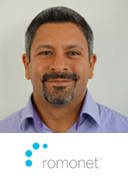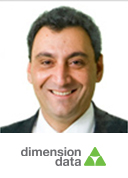INSIGHTS
Q&A: A Global View of the Technology Revolution
In his poem, The Blind Men and the Elephant, John Godfrey Saxe offered a fable of how different people see the same thing quite differently. To one blind man, the elephant is like a tree, because he has felt only the leg. To another, who feels the side of the elephant, it is like a wall.
And so it may seem when trying to understand how transformation of the data center is proceeding in different regions. To get the complete picture, we turned to Steve Nola, the global group executive for IT as a Service (ITaas) at Dimension Data. He sees the whole of the elephant for what it is.
"There is an underlying acceptance [among enterprises] that they have to move towards some of these new technologies just to be competitive. But the question is the speed of which people go through it – and some changes are forced upon by regulation and government compliance."
Transform: In your view, where are technologies like the hybrid cloud most helping to optimize performance of the data center?
Nola: Obviously the most mature market is North America. From our view, the cloud and those aspects are very well accepted. Now it's not a question of, "Do you?," it’s “How do you do certain things.” It’s also a question of the speed at which this happens. So clearly, more mature markets [are leading this trend] and the quickest adoption is happening in the North American market. We see that because of maturity of that market itself. Clearly there are some external and internal factors around it – security around industry certification and compliance issues – that are driving a very different type of discussion in that market.
Transform: Can you tell us what you see happening in Europe?
Nola: Europe is a bit more conservative as a market. I don't think you can look at Europe as just one region, because there are lots of countries that are all at very different stages of maturity and different stages around what's important for those markets.
If I start looking at the UK, it’s pretty aggressive – very similar in terms of the trajectory that we’ve seen in the North America market. If you go to places like Germany and France, they’re a bit more conservative in terms of their approach. Their sovereignty of data is really one of the key drivers prompting people to look at the cloud and hybrid cloud solutions. Those regulations, be it at a country level or by industry level, are driving an interesting set of conversations. Those conversations are still in the earlier stages of "What do we need to do? What are the first processes we need to look at?" It will get there in time.
The opportunity is quite significant in the European market, but you've got to look at those markets very, very differently. Germany is different from France, but how is it different from Italy? Is it as different as the UK is to, potentially, Spain and these type of countries? Each country has its own sort of set of dynamics in the market place, and Europe doesn't operate collectively as one. It's at different levels of maturity.
Transform: Let’s move to the other side of the globe – to Asia. What’s the status of data center transformation there?
Nola: The Asia-Pacific side is similar to Europe. It’s really a country-by-country type of discussion. So if I take Australia, it's a very mature market, a very early adopter of technology, a very sophisticated user of technology. The cloud and that approach is very high on people's agenda. Again, we have issues driving a certain amount of certification, particularly around the banking sector and government sector. That leads to a lot of use cases around where information lives and the whole issue around metadata and how metadata is protected by governments, etc. That’s driving an interesting set of discussions, in particular, around security.
If I move into Asia proper, you get a very mixed bag. In places like Singapore, Malaysia, Indonesia and India, it’s again driven very much by the government sector. It’s less so in Korea where this is in the early days.
Transform: How about the emerging market?
Nola: In emerging markets like Africa, I think they're looking at jumping from one generation back. It hasn’t been as aggressive in the last several years in terms of adopting technology. Now it potentially could leap-frog, bypassing that step and going to cloud. But, again, I think that's a much longer journey for some markets – in particular in the Middle East – than South Africa itself. And again, you get a very mixed bag right across that entire region.
In the past, the cost benefit analysis probably would have made it very difficult for some countries to enter the marketplace purely because of the availability of capital. Having said that, they probably have an opportunity today, through the advent of more public cloud services, to invest differently and get somewhat back into mainstream and be more competitive -- at least in the South African, sub-Sahara sort of environment.
Transform: It indeed sounds like a mixed bag, as you said. Do you see any real commonalities around the globe?
Nola: There is an underlying acceptance [among enterprises] that they have to move towards some of these new technologies just to be competitive. But the question is the speed of which people go through it – and some changes are forced upon by regulation and government compliance. Some [countries will move forward] because they have to be a lot more competitive, because the market globally is now pretty flat. In the past geography used to protect certain countries and certain markets.
The world now is pretty much one market from an operating perspective. So you're now challenged that you're not just competing with companies that are based in your region. You're competing with big guys from anywhere in the world. That creates a different set of challenges. It also changes how you think about the markets that you want to play in, and how you're going to be competitive in their spaces.
More Point of Views

Srini Koushik
Chief Technology OfficerMagellan Health
Point of view story
The Traditional Model of IT is Dead - Meet Exponential IT
Zahl Limbuwala
CEO and Co-FounderRomonet



